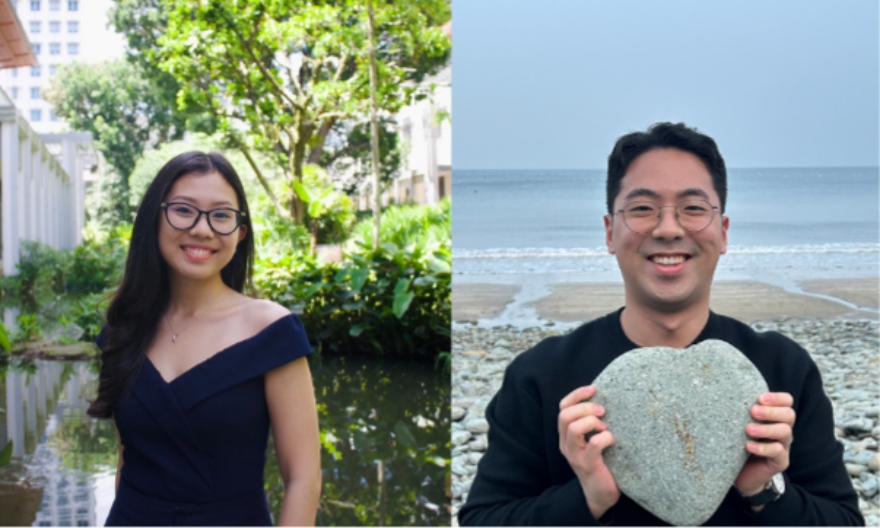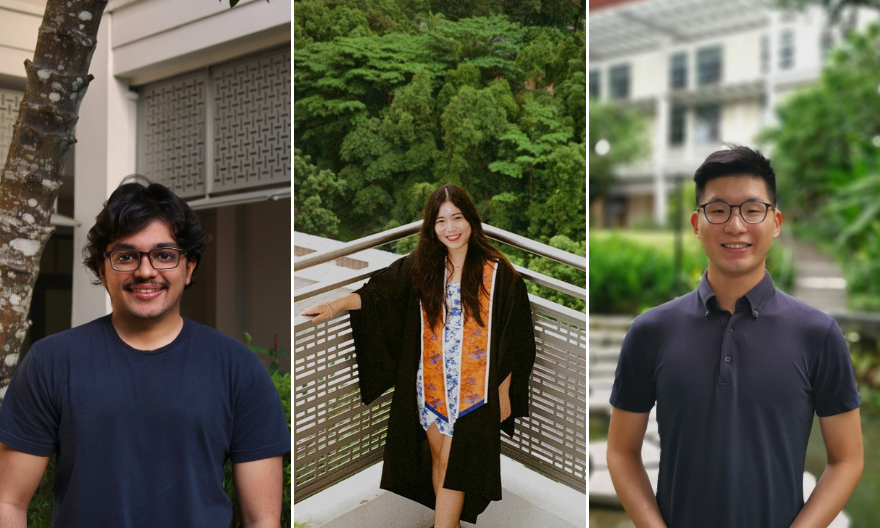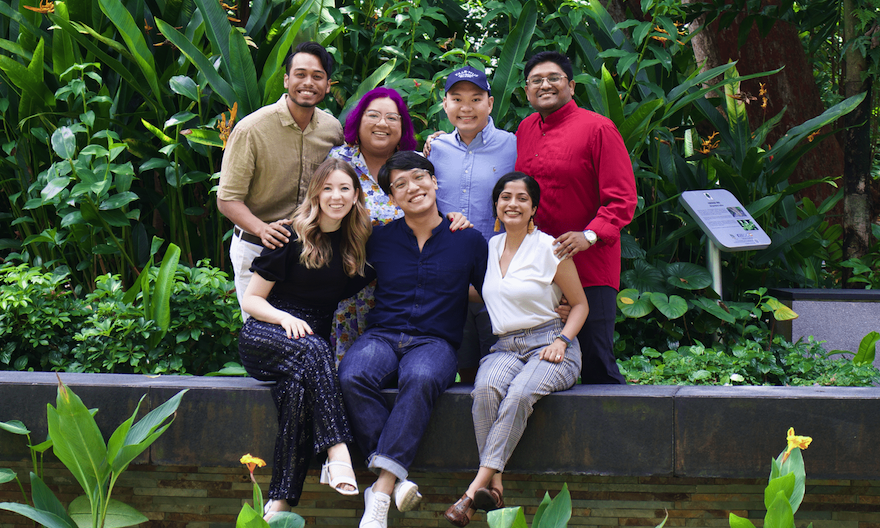Alumni from Yale-NUS build on their skills in science-related research
“I think it is quite a common assumption that scientists don’t have to be good at writing – nothing could be further from the truth!” said Ms Chan Li Ting (Class of 2017). “The committee chair for my thesis was an excellent writer, and had extremely high expectations for written work that came his way. All the writing I had to do at Yale-NUS was extremely helpful.”
Ms Chan has just completed her Master of Science in Medical Physics at Duke Kunshan University in China. “Medical Physics mostly deals with radiation in clinical and health settings,” she explained, “so classes I took at Duke Kunshan included diagnostic imaging, radiation biology, and radiation therapy physics.” She also went on a seven-month study abroad programme at Duke University in Durham, North Carolina, where she conducted research for her master’s thesis: boron nanoparticles that have potential uses in functional cancer imaging.
A Physical Sciences major at Yale-NUS College, Ms Chan decided to pursue a career in medical physics after a short report she wrote on breast imaging in her sophomore year. “The programme at Duke Kunshan also offered the opportunity to interact with medical physicists in both the United States as well as Asia,” she said, which was ideal for her since she intended to return to Singapore to work.
Besides the critical writing practice, Ms Chan said that Yale-NUS prepared her for higher academia in other ways. Her work on her capstone paper was a natural stepping stone to her eventual master’s thesis research on boron nanoparticles. “Since I had worked on nanodiamonds for my capstone, some of the things I had learnt then helped bring me up to speed when I started work on my thesis,” she said.
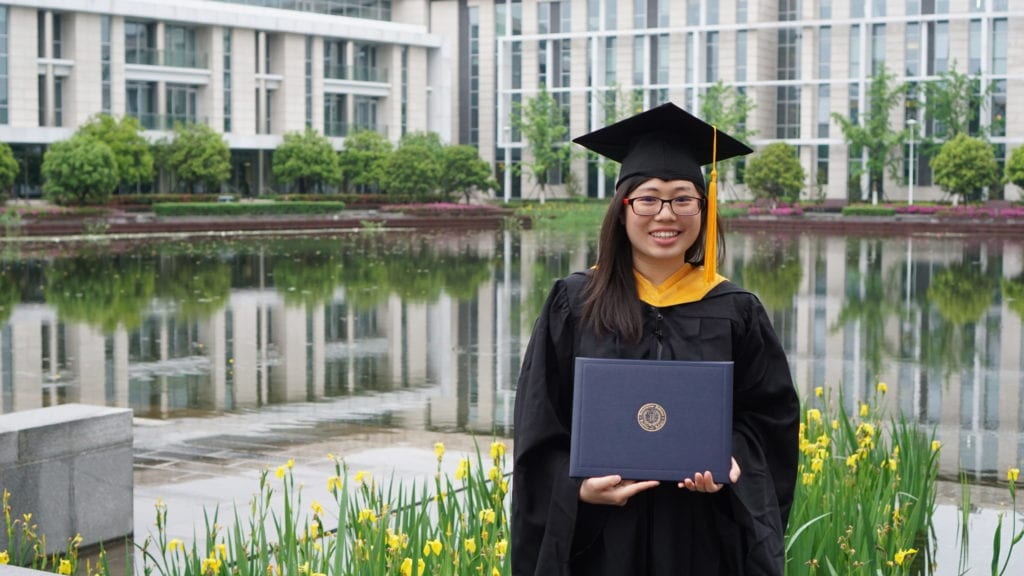 “I think Yale-NUS has trained us to learn new things with relative ease, so I didn’t find the biological side of medical physics particularly difficult.” Image provided by Ms Chan Li Ting.
“I think Yale-NUS has trained us to learn new things with relative ease, so I didn’t find the biological side of medical physics particularly difficult.” Image provided by Ms Chan Li Ting.
Ms Chan said that one challenging aspect about graduate school was having to narrow her area of study, which she was unprepared for, since Yale-NUS encouraged exploration outside one’s academic disciplines. “After the initial euphoria of graduate school faded,” she said, “I found myself a little frustrated that most of my work was just dealing with mathematical equations.” To counter this, she jumped into a number of extra-curricular activities, including joining the orchestra and a language partners’ programme, and even dabbled in some research into Shinto history which culminated in an oral presentation at a World History Student Conference organised by King’s College London.
Ms Chan thoroughly enjoyed her lab experience. Soon after joining the lab, she was given the opportunity to present a poster at the American Association of Physicists in Medicine (AAPM) Annual Meeting. “My lab mates and mentors were very nurturing and encouraging,” she said. “Duke Kunshan, like Yale-NUS, was a new school with an intimate community. And as with most things, I think it is the community that makes or breaks one’s experience.”
Mr Yonatan Gazit (Class of 2018) echoed Ms Chan’s views, noting that he really appreciates his lab partners. “They’re all incredibly knowledgeable, but more importantly they’re happy to share and teach,” he said. “It makes every day rich with learning opportunities.”
A research assistant with the Centre for Advanced 2D Materials (CA2DM) at the National University of Singapore (NUS), Mr Gazit recently wrapped up a project exploring the feasibility of scaling a water filtration method to industrial levels. “The lab had found that a specific material they synthesised is much more efficient at a specific water filtration method,” he explained. “My role was to find out how to transform a bench-top synthesis method of that material into a much larger scale production, and estimate the costs of industrial-scale filtration.”
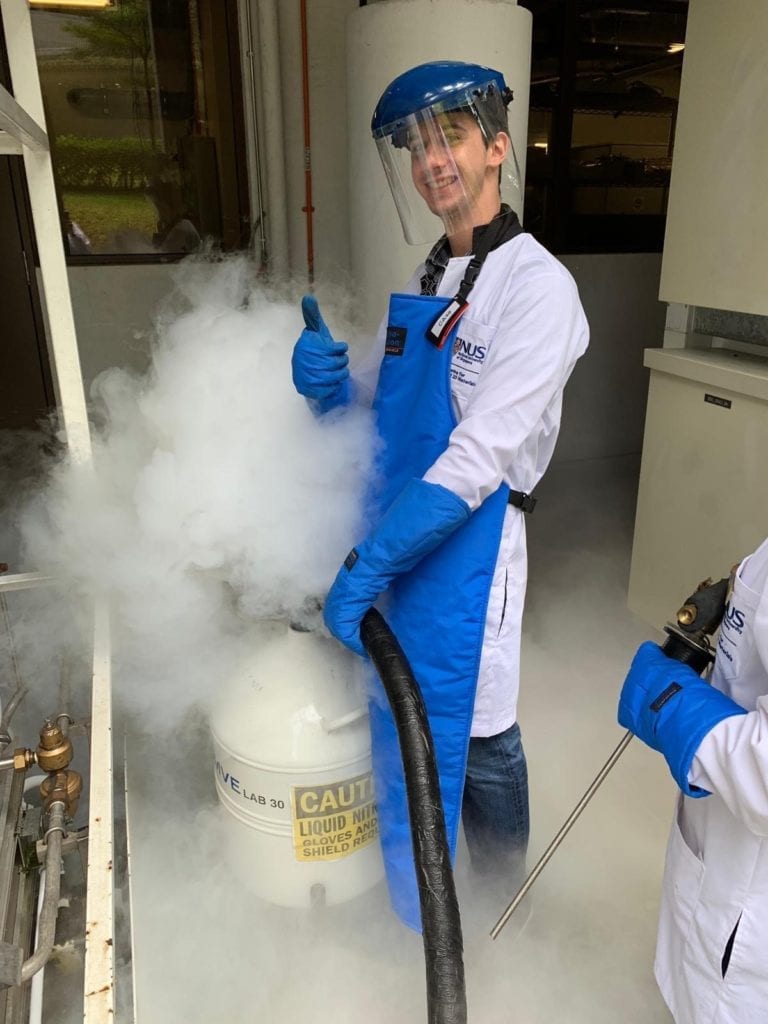 “Most days are filled with these fun little learning experiences that keep me excited about being in the lab.” Image provided by Mr Yonatan Gazit.
“Most days are filled with these fun little learning experiences that keep me excited about being in the lab.” Image provided by Mr Yonatan Gazit.
As with any science research, failure is part and parcel of an experimenter’s life, and it is no different for Mr Gazit. “Sometimes I can be trying the same experiment over and over for a few weeks without any progress,” he said. “Sticking through those periods can get pretty tough the longer they drag out.”
Nevertheless, Mr Gazit enjoys the hands-on work he gets to do in the lab. “There’s a fair amount of physical labour and technical knowledge required to execute a cutting-edge, modern-day experiment,” he said, outlining how one of his team members taught him to make a distillation setup for creating ultra-clean solvents. “It’s very interesting, however, to see how this physical work – mixed in with some determination, skill, and luck – can turn into meaningful results.”
Ms Clin Lai (Class of 2018) is also a research assistant, with Duke-NUS Graduate Medical School. She works on various neuro-behavioural research relating to sleep habits and circadian rhythms, and what happens when those are disrupted. “In one of my research projects, I looked at how the variability of sleep timing during work or school and the weekends can affect the mental health of adolescents in Singapore,” she said. “I found that sleeping very differently on the weekends as compared to work days seems to increase the chances that adolescents would report depressive symptoms.”
Ms Lai’s responsibilities cover almost every step of the experimental process, from recruiting participants and collecting data, to calculating statistics and drafting papers. “In one day, I could be on a phone call with a participant in the morning, calculating global scores for different psychological variables in the afternoon, and then writing sections of a manuscript in the evening,” she said.
With the variability of responsibilities every day, Ms Lai finds that keeping track of everything is one of the most challenging aspects of her role. Data processing and analysis requires writing code in a programming language called R, and she finds it a struggle to keep track of the various versions of code she has updated every day. “The best thing is to just write down everything on a notepad somewhere. And remember where you saved the notepad,” she added.
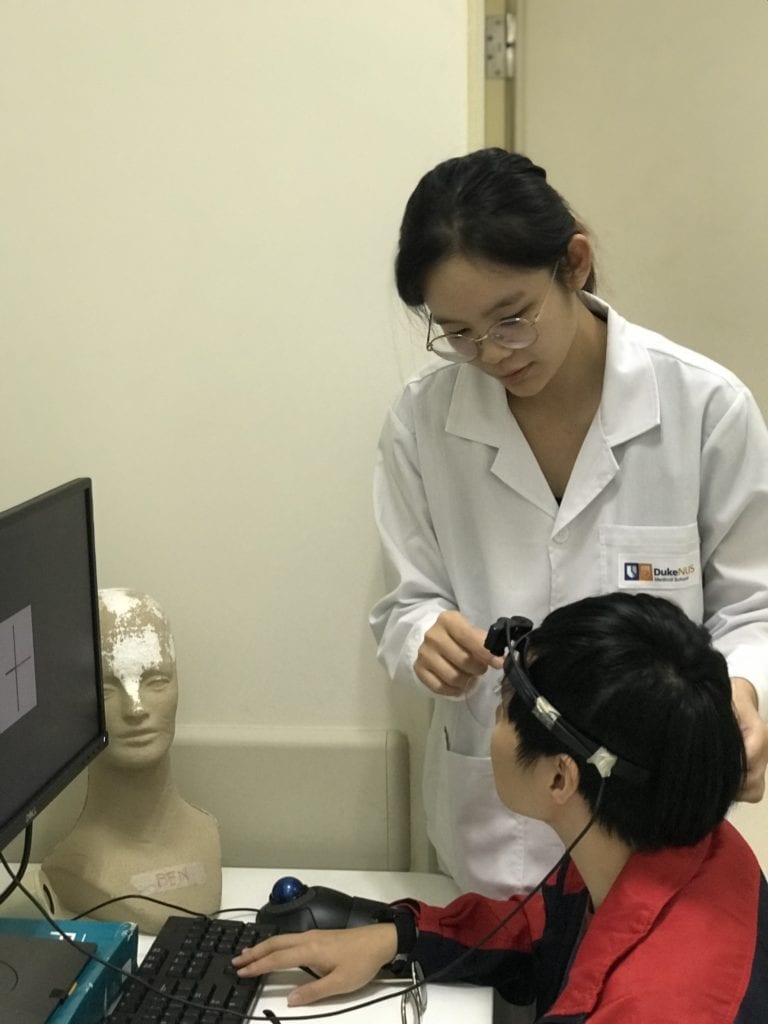 “I remember when I was learning how to use an eye tracker device, I held it in my hand and wondered how humans have progressed to a point where we can infer thought patterns and attention so easily.” Image provided by Ms Clin Lai.
“I remember when I was learning how to use an eye tracker device, I held it in my hand and wondered how humans have progressed to a point where we can infer thought patterns and attention so easily.” Image provided by Ms Clin Lai.
At Yale-NUS, Ms Lai said she developed the ability to grasp new knowledge quickly, as well as to write succinctly and coherently – skills which she is grateful for learning while she was a student. “It is sometimes difficult to predict what assortment of knowledge and skills are required for a particular role,” she said. “Hence, I very much appreciate that Yale-NUS gave me the ability to both flexibly process different spheres of information, and then subsequently express them in a cogent manner.”
It is this constant learning and constant discovery that Ms Lai finds most exciting about her research job. “There isn’t one ‘Eureka’ moment,” she said. “Research, for the most part, is a slow, constant realisation about a tiny aspect of the world.”

